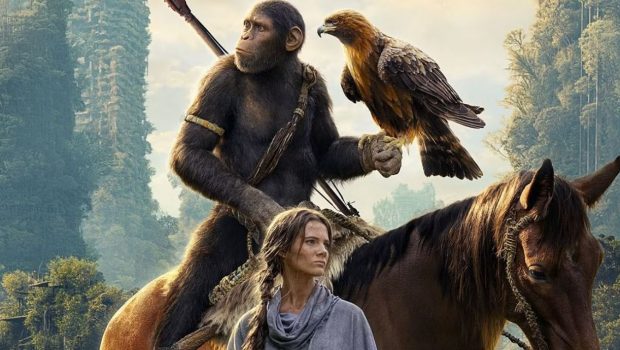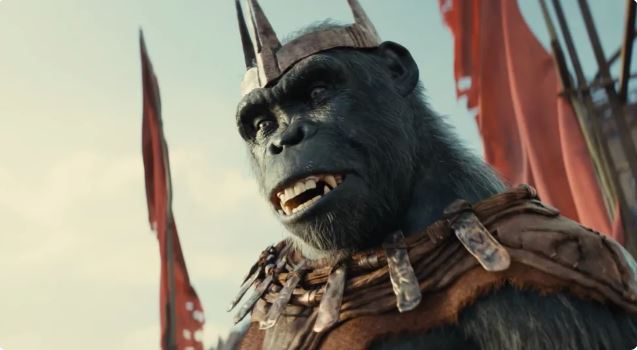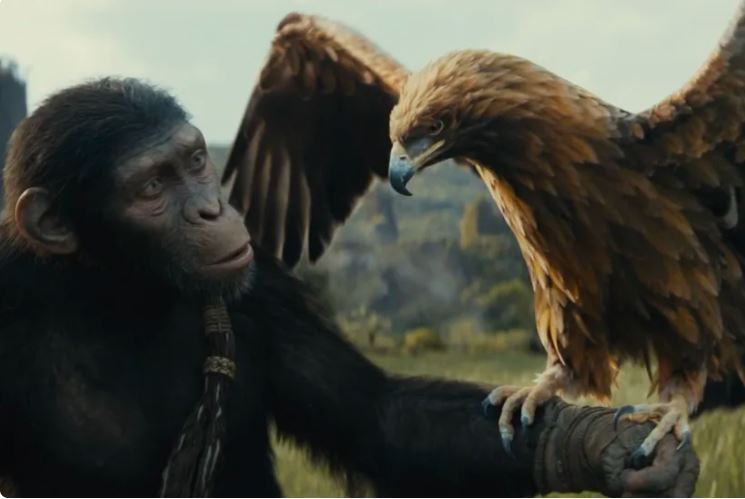Kingdom of the Planet of the Apes – Film Review
Reviewed by Harris Dang on the 9th of May 2024
20th Century Studios presents a film by Wes Ball
Produced by Wes Ball, Joe Hartwick Jr., Rick Jaffa, Amanda Silver, Jason T. Reed
Starring Owen Teague, Freya Allan, Kevin Durand, Peter Macon, and William H. Macy
Running Time: 145 minutes
Rating: M
Release Date: the 9th of May 2024
Set 300 years after the events of War of the Planet of the Apes, Kingdom of the Planet of the Apes is set in a civilization where apes have become the alpha of the world order (led by the teachings by Caesar, played by Andy Serkis in the prior films) while humans have devolved into a primitive state. The film tells the story of Noa (Owen Teague), a chimpanzee hunter who is on a quest of revenge and rescue as his village was attacked by a rival clan, led by the malevolent ape king Proximus Caesar (a menacing Kevin Durand).
The quest may seem simple but Noa delves deep into a moral quandary as rival apes use the teachings of Caesar as a guise for their own self-gain and signs of humanity begin to eke sympathy from him. Through the alliance between a human woman Mae (Freya Allan), the two team up as their journey determines the fate of both human and ape alike.
Kingdom of the Planet of the Apes is the latest film in the Apes saga, as it continues from the series led by Andy Serkis with numerous references to the events of those films. The trilogy has been critically revered due to its visual spectacle, poignant drama, and a brilliant performance from Serkis. The filmmaker leading the way is Wes Ball, who is best known for directing the Maze Runner trilogy. Having shown proficient handling in blockbuster spectacle, ambitious storytelling, and solid action chops, it appears Ball would be the perfect director to take over the saga after Matt Reeves’ acclaimed efforts. Will Ball deliver on his potential?
Ranging back from the original 1968 film Planet of the Apes, the films in the saga have always been striking and ambitious. From its daring storytelling in the 1968 film (where it dares to end with its marvellously bleak reveal), its politically and brutally incendiary tone in Conquest of the Planet of the Apes, and the pioneering technological advances in the Andy Serkis films, the saga has for the most part, kept a high standard. In the case of Kingdom, it is unfortunate to report that it does nothing to reach or expand from the feats mentioned.
It is not a terrible film by any means, as it manages to provide an intermittently exciting time through its tried-and-true formula that is the conflict between humans and apes. But considering the quality that came before it, it just comes off as a disappointment. The jump from Matt Reeves to Wes Ball is deeply felt and certainly not for the best. The visual inspiration is lacking as the settings (and lack thereof) feel repetitive and mundane and the direction comes across as professional at best and at worst uninspiring. The integration of the animals with the green-screen environments lacks the tactility that one would draw from the real-world environments that the prior films touched on more. The CGI and special effects are still high quality but it feels rote and nothing sticks out as memorable.
And the same case goes for the characters. While the cast do their very best in imbuing their roles with heart and verve, they are not given as much characterisation to explore. The notable exception is the role of Noa and Nova, who are both given compelling conflicts in terms of what is notably right and what is notably easy in relation to survival. Teague and Allan lend the right physicality and conviction to the parts. However, they prove to be inferior to the efforts of Andy Serkis, thereby leaving the film without a compelling core that should make the drama emotionally stirring.
What also does not stir is the conflicts in the storytelling. The conflicts involving indoctrination, man vs. nature, fascism, slavery, and racism are all timeless and have been examined in the film since 1968. But without the visual inspiration and the compelling characters to back it up, it just feels like reheated leftovers with little investment. And when there is little to emotionally invest, one notices the illogical factors in the story. For example, how is it that an electricity plant can run after 300 years? How is it that books that the apes utilize as history can last 300 years?
Throw in a bloated runtime of 140 minutes that places too much time on exposition and contemplation at the expense of tight pacing and you have a letdown. Kingdom of the Planet of the Apes may please those who enjoy the familiarities of the saga. However, those who are expecting something more daring, ambitious, and epic in scope may feel shorthanded.
Summary: It might please those who enjoy the familiarities of the saga. However, those who are expecting something more daring, ambitious, and epic in scope may feel shorthanded.









